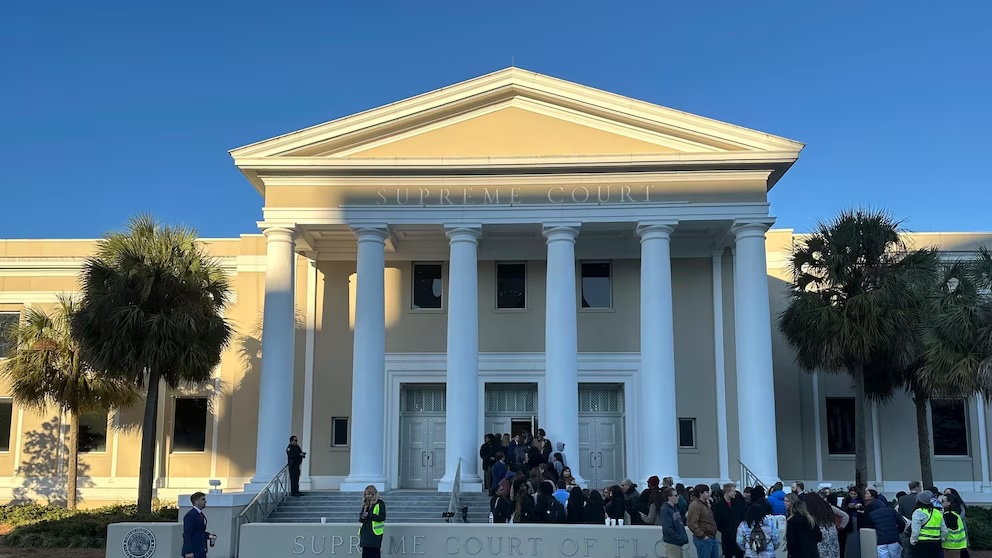
The fight for bodily autonomy took on another dimension when the Alabama Supreme Court decided that frozen embryos used in in vitro fertilization (IVF) should be considered children. On February 16, 2024, Chief Justice Tom Parker issued a ruling that gave rights to frozen embryos, allowing parents to receive financial damages when a fetus died or to sue in civil court. In his arguments, the chief justice pointed to one source of the court’s judgment: God.
The United States is founded on the principle of separation of Church and State, however, in the wake of the overturning of Roe v. Wade, the abortion fight has brought into question just how separated these two institutions are. This is seen in arguments advocating for “fetal personhood,” stating that fetuses have souls, that it is wrong in God’s eyes to have an abortion. Now, according to Chief Justice Parker, that frozen embryos are considered children. To get to this judgment, the justice cited the biblical Book of Genesis, an obscure 17th century Dutch Protestant theologian, and Saint Thomas Aquinas, a Catholic theologian and philosopher—ultimately to argue that Christianity is in agreement that human life starts at conception and that God views ending a life as a personal affront.
Not only are the references to religion in a legal decision an explicit violation of the separation of Church and State, there are inconsistencies within the religious argument. Specifically, quoting Aquinas might have been a mistake, considering that the Italian priest in fact did not think that fetuses were people until much later in the pregnancy. He held the common belief that fetuses went through a vegetable and animal phase with their souls before finally reaching human rationality towards the end of pregnancy, and thus did not deem early stage embryos as people. Furthermore, while IVF was controversial in its beginning in the 1970s, it is now widely accepted, with only 12% of US citizens considering it to be “morally wrong” according to Pew Research. With this court decision, the Alabama Supreme Court single handedly granted personhood to frozen embryos, yet left out many details regarding the implications of this ruling, such as whether IVF can legally continue, leading to multiple treatment centers to shut down immediately after the ruling.
While the overturning of Roe v. Wade has been one of the biggest successes for conservatives in America and an accumulation of decades of lobbying and activism, the post-Roe world has left chaos in the Republican party, exemplified by this decision. The Republican Party is being pulled between their conservative base and the more moderate voters that are critical to win the 2024 election—and who overwhelmingly support IVF and women’s bodily autonomy. So, while Democrats have jumped on this ruling as another political opportunity to showcase the ultra-conservative agenda attempting to control women’s bodies, Republicans have struggled to come up with a response. Former presidential candidate Nikki Haley fumbled her response, simultaneously stating that fetuses (and embryos) are babies, but that she disagrees with the ruling, while Senator Tim Scott simply stated that he hasn’t “studied the issue” and thus doesn’t want to comment. The biggest name and loudest voice in the Republican Party—Donald Trump—came out against the ruling, highlighting the divide.
Ultimately, the GOP is at a loss when it comes to the ruling, providing a vulnerability in a highly contested election year. Alabama already passed a bill to protect doctors doing IVF from criminal or civil liability if embryos are damaged or destroyed, which is in conflict with the ruling and highlights the divides within the party.
Ultimately, this ruling has shown the cracks in Republican logic and support and provided a useful weakness for Democrats to exploit. The lack of response from many Republican politicians, conflicted messages, and unsure actions highlight the lack of direction within the party in a post-Roe world, while the Democrats have a new reignited purpose. Biden’s presidential campaign and many other democratic campaigns around the country can add this to their rallying cry, lengthening the list of the ultra-conservative and controlling rulings and bills.
While the conservative and regressive rulings like this are disheartening, it might be the Republicans shooting themselves in the foot. It is rulings and judges like this that outrage progressive voters and will ultimately provide an incentive for voter turnout, fundraising, and campaigning for Democrats. So, whether we like it or not, this ruling might just be the key reminder that left-wing citizens need to mobilize in this election year and remember what we are fighting for.



